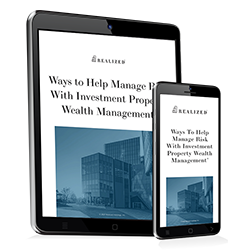
Real estate investors often use leverage to help increase the performance of their returns. While this works well when property values are appreciating and operations are running smoothly, it can backfire when things aren’t going as well. This problem is exacerbated when an investor decides to over-leverage.
What Is Leverage?
Leverage is a loan used to supply additional capital to an investment. In other words, an investor can buy more of an investment with leverage.
Why would an investor want to use leverage? The simple answer is to increase returns. We can see this best through an example.
Let’s say an investor wants to buy a $500,000 property. Twenty percent down is $100,000. If the property increases by 3% after one year, the value will be $515,000. For the investor, they made $15,000 on their $100,000 investment or a 15% return.
Utilizing leverage on the same investment, the investor decides to get a $50,000 loan and add $50,000 of his capital. The property’s value goes up by the same amount. This time the investors return is $15,000 on $50,000 or 30%. That’s twice the return from the first example. Of course, the reason is that the investor used only half as much of their capital.
What about adding even more leverage? If the investor decided to get a $75,000 loan and put up only $25,000 of their capital, the result would be a 60% return. In this case, the investor is leveraged 3X. The loan is three times more than the investor’s capital.
These examples are simple and ignore related costs such as closing costs, loan interest, loan origination fees, etc.
The above shows the positive side of leverage. But what happens when things go wrong?
What Happens With Over-Leverage?
First, what is over-leverage? There isn’t a clear demarcation that determines over-leverage. In general, over-leverage means that an investor has taken on a large amount of debt, in comparison to their capital, to finance an investment.
In the above example, our investor borrowed $75,000 against their $25,000. This created a 3X leveraged scenario. Is 3X over-leveraged? The answer is very likely yes. Some may say an investor is over-leveraged once the loan value exceeds the original capital added by the investor.
Knowing that you know what over-leverage is, what is wrong with being over-leveraged? Just as our 3X leveraged investor was able to produce a whopping 60% return, the same can happen in reverse if the property's value falls.
To see this in action, consider that the property's value decreases by 3% instead of increasing. The property is now worth $485,000. The investor only put $25,000 into the property. Their equity is worth only $10,000 — a 60% decrease in their equity. The property only dropped by 3%, but because the investor was highly leveraged (i.e., over-leveraged), the investor amplified their loss.
When determining how much leverage to use, it’s important to understand how much money you can lose through the use of leverage. That will help in setting a limit on the amount of leverage.
It can be tempting to over-leverage because of the potential boost in gains. Just keep in mind that leverage is a double edge sword.
This material is for general information and educational purposes only. Information is based on data gathered from what we believe are reliable sources. It is not guaranteed as to accuracy, does not purport to be complete and is not intended to be used as a primary basis for investment decisions. All real estate investments have the potential to lose value during the life of the investment. All financed real estate investments have the potential for foreclosure. Investing involves risk, including possible loss of principal. A bond's yield, share price and total return change daily and are based on changes in interest rates, market conditions, economic and political news, and the quality and maturity of its investments. In general, bond prices fall when interest rates rise and vice versa. Examples shown are hypothetical and for illustrative purposes only.



